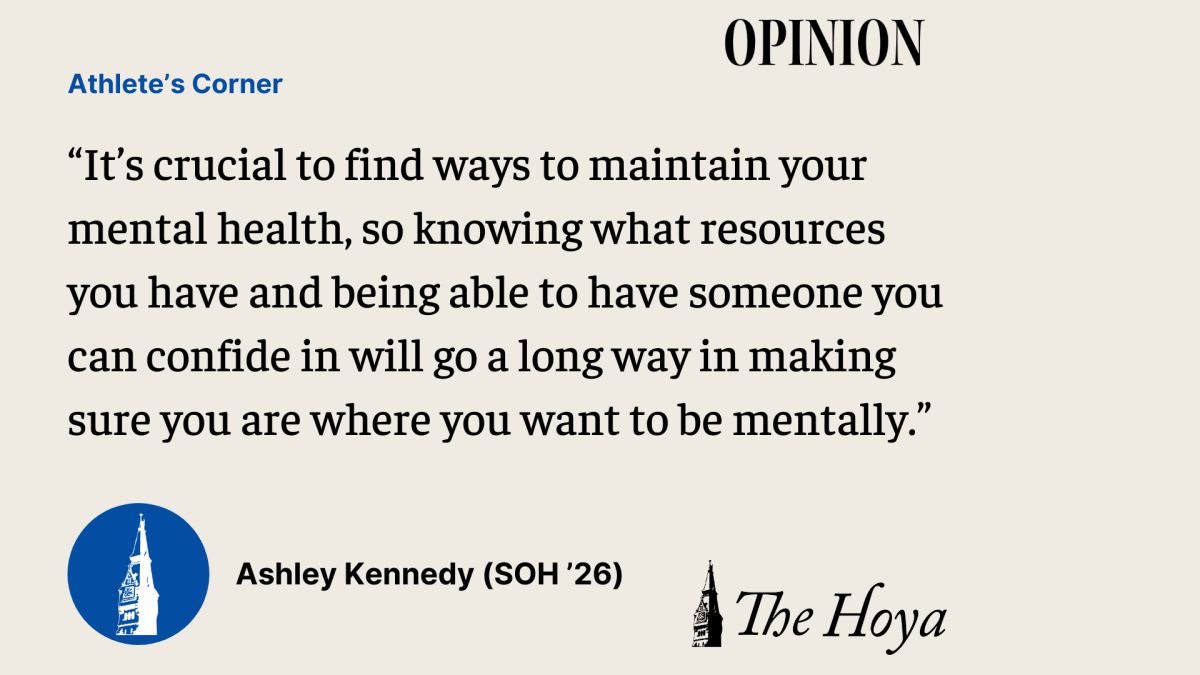It can be challenging — and extremely stressful — to balance life as a student-athlete: practice, classes, studying, extracurriculars and even just spending time with friends. After all, there are only 24 hours in a day. Everyone wants to give their all to their respective activities and achieve all they can, but this level of pressure and expectation can be draining, both mentally and physically. In my experience, mental and physical health are connected, so taking care of both is critical to living your best life.
I have realized that having an outlet is crucial for maintaining my mental health. Allocating sufficient time during my day to hang out with friends, decompress when I am feeling stressed or engage in a personal hobby really helps me relax and stay happy.
Personally, my outlet is tennis. Don’t get me wrong, this can lead to stress of its own. But I am constantly reminded of how lucky I am to be playing Division I tennis at a school I love with such an amazing team. There are definitely days when I’m exhausted from overexerting myself or feeling incapable of putting my best foot forward, but the simple act of being around my team and engaging in my sport lifts me up.
A key feature in maintaining your mental health is to develop personal methods of dealing with the stress of daily life. This will keep your mind calmer: Having a plan of attack to manage stress or anxiety during your day will allow you to automatically know what to do in stressful situations. This plan could be a breathing exercise, something you say to yourself mentally to keep you calm or simply walking away from the situation (if possible) for five minutes to formulate a plan to address your stress.
Morning routines also help with mental health; think of something you can do every morning that helps start your day on a more positive note, like saying something to yourself in the mirror or even waking up to your favorite song so you can feel happy when you first get up.
I recently volunteered at a Strong Girls United event here at Georgetown University where I worked alongside fellow female student-athletes to teach young girls about the mental aspects of athletics. I found this to be a very rewarding experience for both the younger girls and all the student volunteers, myself included.
What stuck out to me the most during the event was an activity centered around identifying what we say to ourselves when feeling nervous. In fact, some of the girls stated that they’ve never felt nervous, so they just didn’t write anything down. In that moment, I remembered a time when I was in their exact shoes — being at an age where I didn’t feel nervous about anything yet. But it also brought back memories of growing up and learning different ways to handle my developing nerves from parents, coaches and teachers until I found what worked best for me. Ultimately, prioritizing and valuing one’s mental health is something we should learn at a young age; all kids should learn how best to handle their own emotions, nurture both their minds and bodies and the importance of being able to overcome challenging situations.
Educating kids early on about mental health will help them develop the necessary methods and tactics to overcome stress and anxiety before it becomes mentally damaging. As college students, this is a skill we most definitely need to continue valuing. I find athletics to be a great way to combat feeling overwhelmed or drained. It’s cathartic to me personally, and while it might not be up everyone’s alley, I encourage giving it a shot — or finding a more appealing alternative. Your outlet should ultimately be something you find enjoyable. It is never too late to try something new.
Furthermore, if someone you know is struggling with mental health, it is important to know that there are accessible avenues for help, treatment and guidance. For example, the office of Counseling and Psychiatric Services (CAPS) is a resource here at Georgetown that is staffed with psychologists and mental health professionals. Additionally, the Georgetown Athletics Department partners with the national organization Morgan’s Message, which aims to spread mental health awareness to student-athletes of all ages across the country and advocates for the implementation of mental health resources.
Yet there is still room for our community to improve. The growth of mental health resources here at Georgetown is vital for not only helping student-athletes, but all students here on campus. It’s crucial to find ways to maintain your mental health, so knowing what resources you have and being able to have someone you can confide in will go a long way in making sure you are where you want to be mentally.
Ashley Kennedy is a sophomore in the School of Health. This is the second installment of her column “Athlete’s Corner.”




















